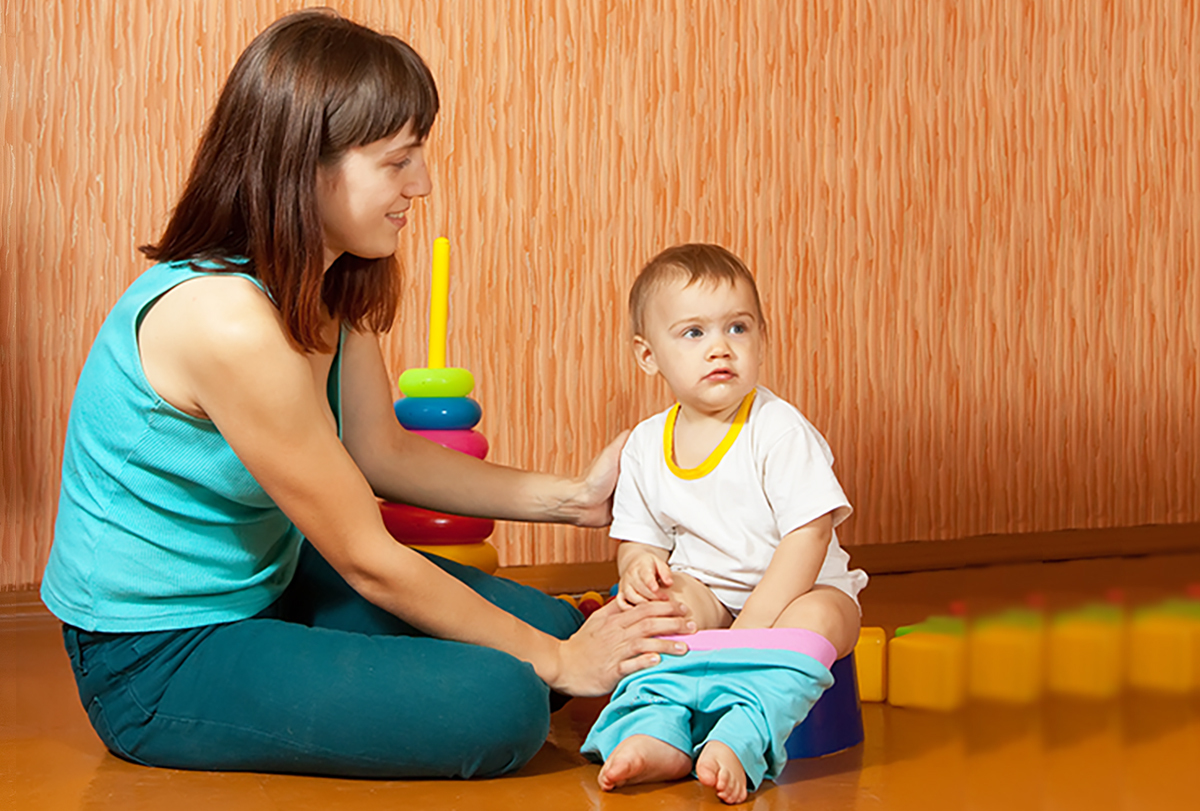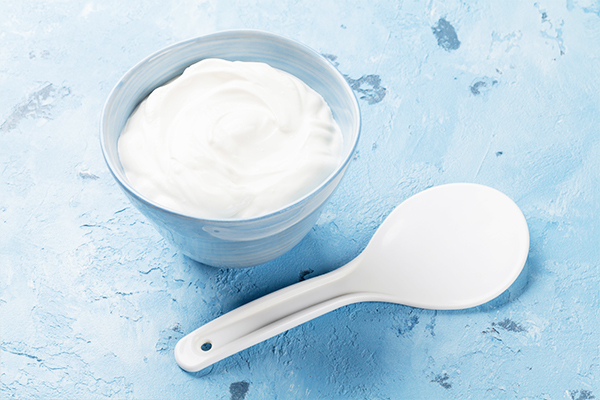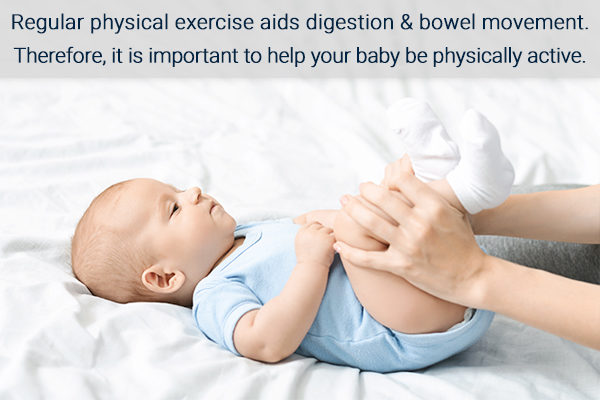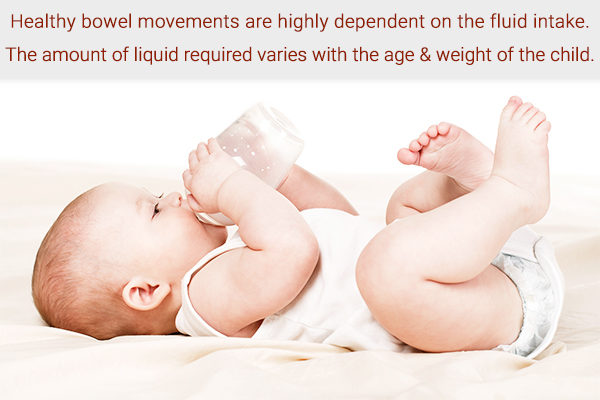In this article:
Constipation in infants is a common source of concern for parents. However, it is completely normal as the baby adapts to different food types.

Moreover, an irregularity in the bowel movements is not indicative of constipation in all cases. The child may be withholding stool due to a fear of pain, which can be corrected through supportive measures.
Home Remedies
Try these simple home therapies to relieve constipation in babies without the use of medication:
1. Massage your baby’s tummy
Massaging your baby’s stomach area can help stimulate bowel movements and also relieve colic pain and gas. Children who were massaged twice a day, 15 minutes each, for 14 consecutive days, had an increased number of defecations. (1)
To perform massage, apply a cream or oil over your baby’s stomach. Place your finger on the baby’s belly button and move them in a clockwise direction.
Massage is an effective and safe self-treatment method for constipation resulting from various physiological causes. (2)
2. Use probiotic-containing baby formula

Probiotics contain live strains of bacteria similar to those living in the intestines.
The use of Lactobacillus was shown to improve the frequency of defecation in infants, thus acting as a possible alternative treatment method and preventive measure for functional constipation. (3)(4)
You can use available infant formulas that contain probiotics upon consulting your doctor.
Probiotics are gut-friendly bacteria that aid digestion. Therefore, their use can help manage digestive disorders, such as constipation.
3. Feed your baby prune/apple juice
The use of juices such as pear, prune, and apple juice help soften the stools in infants. (5) Give diluted juices to your child above 6 months of age.
You may make a prune juice at home in the following way:
- Mix prunes with water in a ratio of 1:5.
- Simmer the mixture for four hours, remove the pits, and blend the remaining mixture.
- Filter and feed the juice to your child.
However, avoid over-use, as it may lead to malnutrition or diarrhea. To determine the correct dosage, you may consult a pediatrician.
4. Give your baby a warm bath
A warm bath can help relax the gut muscles and thereby aid smoother bowel movement. The gentle heat penetrates into the body to stimulate blood circulation which can loosen tense muscles.
It is important to note that this is an anecdotal remedy with no scientific evidence. However, it can be tried due to its ease and no side effects.
Note: Always consult your baby’s pediatrician before trying any new therapy or remedy to avoid undue side-effects. The same goes for standard medical interventions to treat infant constipation like laxatives, suppositories, stimulants, etc. which have to be approved by the doctor first.
Ways to Manage Infant Constipation at Home
People have been using home remedies to provide relief from constipation to babies for long. These easy and reliable strategies include:
1. Performing exercises

Regular physical exercise aids digestion and bowel movement. This can be done by:
- Helping your baby do leg bicycle exercises
- Encouraging your infant to crawl more
- Helping your toddler to walk after eating
It has been observed that active babies have lesser complaints of gas, pain, and constipation. (6)
Note: Do not lay your baby down on their stomach immediately after feeding.
2. Maintaining optimum fluid intake
The most frequent cause of constipation in babies is the lack of fluid in their diets.

Infants should be given milk as it contains all the necessary nutrients and around 80% of water as well. Children older than 18 months should be given plenty of water. (7)(8)
Furthermore, you can feed your child with mashed fruits as they have a high water, fiber, and nutritive content, as well.
Give your child adequate amounts of water throughout the day. You may also feed your infant with small amounts of diluted juices to help loosen stool upon consulting your pediatrician.
3. Modifying diet
Fibers cannot be digested and, therefore, are essential for adding bulk to the stool. They also absorb water, making the stools soft. (9)
Fiber-rich foods include fruits, soft-cooked vegetables, cereals, whole-grain bread and muffins, oatmeal, popcorn, and yogurt. Avoid substituting fruits with juices as they don’t have much fiber, and instead contain concentrated fruit sugars.
Increase the fiber content in your child’s diet gradually over a few weeks, accompanied by increasing fluid intake, rather than doing it at once. It is advised to ask your doctor about switching to solid foods for infants younger than 1 year.
4. Potty training
Most children attain suitable physical development and readiness for training between 1.5 and 2.5 years of age.
A few toddlers get constipated when they start potty training. The reason can be reluctance in using the toilet due to anxiety or being in a new environment such as a preschool or a house.
Therefore, it is important to be patient when training your toddler to use the toilet. Set a proper routine and teach the correct position for defecation to the child.
How Can Constipation Be Prevented?
The following measures may help prevent your child from being constipated:
1. Fix a schedule
Getting your toddler into a habit of defecating daily may prevent them from trying to hold in the poop. Additionally, develop a schedule for meals since eating is a natural stimulant for the bowels.
2. Reassure them
Most babies get constipated because they are uncomfortable with the idea of visiting the bathroom. Therefore, it is important to have an open conversation with them to make them comfortable.
3. Inculcate a habit of defecation
Make your child understand that having a bowel movement whenever they feel the urge is a good habit, even when at their preschool. If they resist their bowel movements, make them sit on the toilet for around 10 minutes at the same time daily, preferably after a meal.
Avoiding the following factors can help in preventing the condition from getting worse, including:
- Consumption of a diet rich in starchy, sugary, or fatty foods, which can slow down bowel movements
- Addition of malt extract, rice cereal, or any sugar to formula
- Feeding apple sauce, cooked carrots, bananas, and rice to the toddler
- Giving solid foods to babies below 6 months of age
- Intake of cow milk by constipated babies
- Use of medications without a doctor’s recommendation
Infant Dyschezia

During a bowel movement, the baby may groan and apply pressure, generally considered to be signs of constipation. (10)
As a result, the face reddens and the child might even cry, although eventually passing soft stools. This behavior is known as infant dyschezia, and it usually happens if the child has not yet gained full control of the pelvic muscles.
However, if your child passes soft or watery stools, they are not likely to be constipated.
What More You Should Know
Can my baby be constipated after vaccination?
Several vaccines produce mild constipation as a common side effect. While it is rarely a concern, you may consult a pediatrician if the symptoms cause discomfort to the baby. Seek advice from the doctor for measures you can take to aid relief or prevent these problems.
Can I give water to my newborn for dehydration?
For children on breast milk or formula, refrain from giving them water without consulting a doctor as it can cause electrolyte imbalance. Dehydration can be corrected using milk itself.
Does iron in formula cause constipation?
Iron, as a contributing factor to constipation, has been a popular myth. However, iron is not a cause of constipation. Therefore, changing the formula to one with low iron content is not required.
Can honey be given to infants for constipation?
Honey, although rarely, may contain spores of Clostridium botulinum bacteria, which are responsible for botulism (a type of food poisoning) in babies. Therefore, it is highly recommended to avoid giving honey to infants below 1 year of age.
Can teething cause constipation in toddlers?
Constipation may accompany teething at times, despite not having any connection. It is thought that the discomfort associated with teething makes the baby reluctant to consume food or drinks, which can cause dehydration, eventually leading to constipation.
Final Word
Your toddler’s constipation can easily be alleviated with the help of dietary and activity changes. However, if the condition does not subside, consult your pediatrician and refrain from using over-the-counter drugs.

- Was this article helpful?
- YES, THANKS!NOT REALLY


